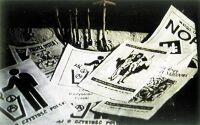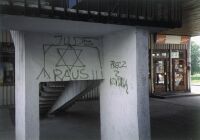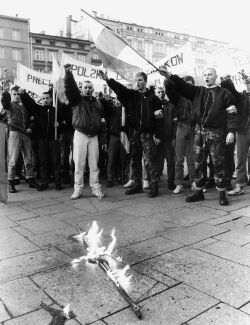





Kraków. Anti-Jewish brochures belonging to the group of young neo-Fascists. In Poland there operate a few neo-Nazi groups publishing their own antisemitic materials
Nationalists' 11th November, Warsaw 1996. National Holiday of Independence turned out to be an opportunity for the nationalists to express their views.
Another example of vandalism - burned antechamber of the Nozick Synagogue in Warsaw. "One cannot live by hate, we would like to forget" - there commented on that event the Chief Rabbi of Poland, Pinchas Menachem Joskowicz.
|

Kraków. Anti-Jewish inscriptions on the buildings' walls are not rare. Is this a revival of the myth of "judeo-commune"?
Devastated Jewish cemetery at Warsaw's Wola (2nd July 1996). 70 gravestones have been destroyed. According to its supervisor, Bolesław Szenicer, devastations, that occured at that cemetery, coincided with important political events: presidential elections of 1991., the case of the Carmelite Sisters from Oświęcim and the anniversary of the pogrom in Kielce.
Presidential campaign 1995. During the consecutive campaigns there were attempts to use anti-Jewish slogans as political weapons.
Anti-Jewish slogans are sometimes used by the fans of the rival footbal clubs. In most cases they do not understand the meaning of the words they shout.
|

Demonstration of the members of the Polish National Community, Kraków's Main Market Square, 11th November 1992.
The Poles are accused of antisemitism not only because of the experiences of the past (the interwar or communist regime's periods), but also because of the present-day actions of some of the political parties. The antisemitic slogans appeared during the last elections, political adversaries were being "accused" of the Jewish origin. The events like skinheads' demonstration at the former concentration camp Auschwitz or atempt of setting fire to the Warsaw synagogue shocked the public opinion all over the world. There also occur profanations of the Jewish monuments and cemeteries. One can also readily notice the anti-Semitic inscriptions on the builgings' walls in Polish cities. Though those excesses are produced by a very small minority, they have damaging effect for the whole process of Polish-Jewish reconciliation.
On the eve of the "Night of Broken Glass" (8th November 1996) in Warsaw there took place the demonstration against Fascism. Fortunately there are people, who perceive the threat of Fascism and want to oppose to it actively.
|

